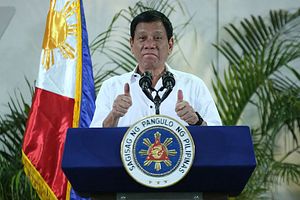Philippine President Rodrigo Duterte has announced that he plans to skip next month’s special ASEAN-U.S. Summit in the United States, which the Biden administration intends as a signal of its commitment to Southeast Asia.
In his weekly address aired yesterday morning, Duterte said his main reason for not attending the summit was that he did not want to make decisions that would run counter to the desires of his successor, who will be elected at a presidential election on May 9.
“If it’s a working conference, there might be agreements and commitments that will be made there,” he said, according to Rappler. “I might take a stand that will not be acceptable to the next administration.”
The special U.S.-ASEAN summit will be held in Washington on May 12-13, just three days after millions of Filipinos go to the polls to elect Duterte’s successor, who will take office on June 30.
The summit was initially scheduled for last month, but was postponed due to schedule clashes. The Biden administration has described the meeting as an important step in its attempts to engage Southeast Asia, a region that sprawls at the heart of the Indo-Pacific and which U.S. policymakers view as central to countering China’s rising influence in Asia.
Duterte’s decision means that the Philippines will be the second ASEAN country not to be represented at the summit by its head of government, with Myanmar’s military junta excluded from the event by mutual agreement of the U.S. government and ASEAN, and no representative from Myanmar’s ousted civilian government invited to attend. It has not yet been announced if anyone will represent Philippines at the summit, though a reasonable bet would be Foreign Secretary Teodoro Locsin.
Duterte’s absence from the summit will be somewhat fitting, given the rocky relationship that he has had with the U.S., his country’s former colonial ruler and longstanding treaty ally and security partner. Duterte has not visited the U.S. since taking office in 2016, and has often clashed with U.S. officials, especially after Washington criticized his bloody war on drugs.
At the same time, he has courted friction with Washington by steering the Philippines into a closer alignment with Xi Jinping’s China, with the aim of gaining access to much-needed Chinese infrastructure financing under the Belt and Road Initiative. Duterte has traveled to China six times since becoming president.
In his address yesterday, Duterte also hinted that there was more to his decision not to attend then the proximity of the presidential election. He claimed that he was told that the U.S. officials wanted him to attend the meeting, but he remained firm in his stance not to go to the U.S. “as a matter of principle.”
“I already said before that I do not want to go and it’s been 20 years, I haven’t been to America,” Duterte said.
Duterte has pledged not to travel to the U.S. due to a range of personal resentments and perceived slights, some dating back to his time as mayor of Davao City on the southern Philippine island of Mindanao, including resentments at U.S. actions in Mindanao during the colonial period and more recent American criticisms of his drug war. In 2020, he announced that he would skip a planned U.S.-ASEAN summit that was eventually postponed due to the COVID-19 pandemic, after his ally Senator Ronald “Bato” dela Rosa, the former police chief who implemented the early stages of his drug war, was refused a visa to visit the United States.
The visa also prompted Duterte to announce the cancellation of the Visiting Forces Agreement, which governs the deployment of U.S. military personnel in the Philippines. However, after being importuned by U.S. officials and (one presumes) key members of Manila’s security and foreign policy establishment, he postponed and then canceled his decision. At the same time, last September, Rappler noted, Duterte said he was considering visiting the U.S. to show his gratitude for its donations of COVID-19 vaccines to his country. Though he didn’t end up visiting, the comment underscored Duterte’s congenital unpredictability, something that U.S. officials are no doubt looking to put behind them.
The summit is an important event for the Biden administration, and leading Asia policymakers would obviously have wanted the president of the Philippines to attend, given its strategic importance and longstanding treaty alliance with Washington. But given Duterte’s history of outbursts and off-piste comments, U.S. officials probably won’t be too concerned about his absence.

































